Martin Edwards's Blog, page 134
November 24, 2017
Forgotten Book - The Third Eye
One of the many pleasures of editing anthologies for the British Library has been the chance to resurrect some splendid but long-neglected short stories, and thereby introduce present day readers to some writers who really deserve to be remembered. Among them is Ethel Lina White, whose "women in jeopardy" novels were very successful in the Thirties. She was also a fine short story writer and a number of Crime Classic readers have told me how pleased they have been to discover her work.
I've just read the novel she published after The Wheel Spins, which Hitchcock turned into The Lady Vanishes. The Third Eye came out in 1937, and my copy is a cheap American paperback with a back cover blurb that not only tells the whole story but gets much of it wrong. Very odd. But the story is, if you like this type of writing, a strong one.
She was good at ringing changes on a basic formula. So here we have, as usual, a likeable and resourceful young woman who doesn't have much money, who - through no fault of her own - becomes a potential murder victim. Caroline takes a job at a public school, whose owner is mysteriously dominated by the very unpleasant matron. When Caroline discovers that the matron is a homicidal maniac, her own life is put at risk.
But the real danger comes from the matron's half-sister, who is equally crazy. She is called Miss Bat, and she lives in - where else? - Bat House. Why on earth any young woman who knows her life is in danger would, on a foggy night, accept hospitality from a Miss Bat of Bat House is beyond me, but there you go. This type of story requires suspension of disbelief aplenty, but the Gothic atmosphere is nicely done, and White shows her customary expertise in the art of building tension.
I've just read the novel she published after The Wheel Spins, which Hitchcock turned into The Lady Vanishes. The Third Eye came out in 1937, and my copy is a cheap American paperback with a back cover blurb that not only tells the whole story but gets much of it wrong. Very odd. But the story is, if you like this type of writing, a strong one.
She was good at ringing changes on a basic formula. So here we have, as usual, a likeable and resourceful young woman who doesn't have much money, who - through no fault of her own - becomes a potential murder victim. Caroline takes a job at a public school, whose owner is mysteriously dominated by the very unpleasant matron. When Caroline discovers that the matron is a homicidal maniac, her own life is put at risk.
But the real danger comes from the matron's half-sister, who is equally crazy. She is called Miss Bat, and she lives in - where else? - Bat House. Why on earth any young woman who knows her life is in danger would, on a foggy night, accept hospitality from a Miss Bat of Bat House is beyond me, but there you go. This type of story requires suspension of disbelief aplenty, but the Gothic atmosphere is nicely done, and White shows her customary expertise in the art of building tension.
Published on November 24, 2017 10:46
November 22, 2017
A Perfect Getaway - 2009 film review
I've been working lately on a short story set on the Hawaiian island of Kauai, one of the loveliest places imaginable. So I was delighted to come across A Perfect Getaway, a film released eight years ago, which is also set on the island. In fact, some of the filming was evidently undertaken in Puerto Rico, another nice part of the world, and I could have done with a bit more Kauai-specific atmosphere. Still, the locations are gorgeous.
We start off with film of a recent wedding, and join honeymooning couple Cliff and Cydney, played by Steve Zahn and Milla Jovovich. They are in Kauai, determined to get off the beaten track. But there's a killer on the loose in Hawaii. A young couple, we learn, have recently been butchered on the island of Oahu.
Cliff and Cydney encounter another couple, and are about to give them a lift in their car when suspicion about the other pair makes them change their mind. They set off on a scenic trail, and soon encounter Nick (Timothy Olyphant), a charming young man who might just be something of a fantasist. When Cliff tells him that he's a screenwriter, Nick is fascinated, and introduces them to his girlfriend Gina (Kiele Sanchez).
The two couples explore the remote parts of the island together, but become increasingly suspicious of each other. Soon the plot thickens, and there are some exciting incidents as the truth about who exactly committed the murders in Oahu emerges. The plot isn't to be taken too seriously, but the action and the scenery are pleasing enough. An entertaining thriller with a few grisly moments. And I enjoyed being reminded of Kauai.
We start off with film of a recent wedding, and join honeymooning couple Cliff and Cydney, played by Steve Zahn and Milla Jovovich. They are in Kauai, determined to get off the beaten track. But there's a killer on the loose in Hawaii. A young couple, we learn, have recently been butchered on the island of Oahu.
Cliff and Cydney encounter another couple, and are about to give them a lift in their car when suspicion about the other pair makes them change their mind. They set off on a scenic trail, and soon encounter Nick (Timothy Olyphant), a charming young man who might just be something of a fantasist. When Cliff tells him that he's a screenwriter, Nick is fascinated, and introduces them to his girlfriend Gina (Kiele Sanchez).
The two couples explore the remote parts of the island together, but become increasingly suspicious of each other. Soon the plot thickens, and there are some exciting incidents as the truth about who exactly committed the murders in Oahu emerges. The plot isn't to be taken too seriously, but the action and the scenery are pleasing enough. An entertaining thriller with a few grisly moments. And I enjoyed being reminded of Kauai.
Published on November 22, 2017 14:46
November 20, 2017
Agatha Christie's Very Secret Notebook
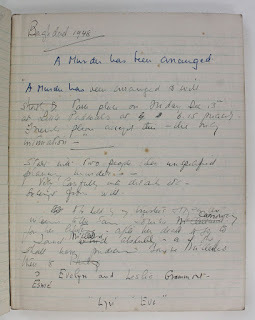
Agatha Christie's secret notebooks - the private journals in which she jotted down her ideas for stories, shot to fame some years ago, when Harper Collins published John Curran's fascinating book about them. What nobody seems to have realised at the time was that there was another notebook out there which was in private hands. It was sold at auction many years ago to an American collector for the princely sum of £240 plus commission. It's now come to light again, having been acquired by James Hallgate of Lucius Books in York,
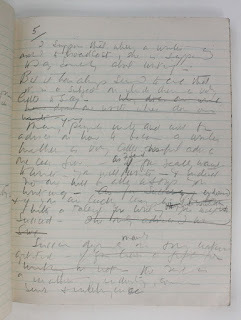
There are some very delightful book dealers around, both here and in the US, and in recent years I've had the pleasure of getting to know quite a few of them. I have to be careful, because naturally they are inclined to lure me into making fresh purchases for my collection! But I find their company very enjoyable, and not only because they supply me with books, information, and background material for my portrayal of Marc Amos and his second hand bookshop in the Lake District Mysteries (though Marc definitely isn't based on anyone in real life!)
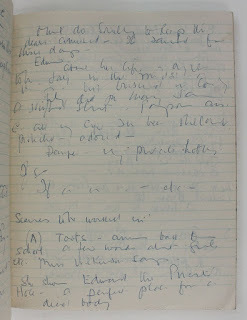
James Hallgate very kindly gave me the opportunity, some time ago, to look at the Christie journal shortly after he'd acquired it, and before he put it on the market. I must say it was a great thrill as well as a great privilege to pore over this fascinating item. Christie jotted her thoughts down casually and, seemingly, carelessly, but if one reads her (not very easy to decipher) handwriting, it's possible to discern her thought processes as she develops her storylines. This journal focuses on one of her finest post-war novels, A Murder is Announced, and it features one of her most cunning clues. There are also extensive notes about the play Spider's Web and other Christie works of the period.
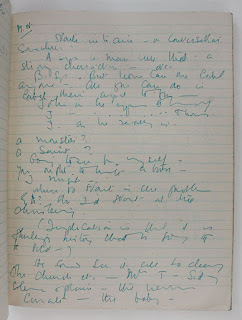
I'm really grateful to James for giving me this memorable experience, and I readily agreed not to write about it until he was ready to market the journal. That time has now come, and I'm also appreciative of the photos that he's supplied to adorn this post. If you want to start saving up for a very special present for that Christie fan in your life, I'm afraid you will have to dig very deep indeed. The price of the journal, housed in a bespoke case, is a mere £45,000. Bargain! Alas, I won't be in the market on this occasion, but others definitely will be,and let's face it, it's a snip compared to a Leonardo. I hope very much the notebook finds a suitable home and that it doesn't altogether disappear from public view for years to come. Like the other Christie journals,it provides a wonderful insight into the workings of the mind of one of the genre's most innovative superstars.
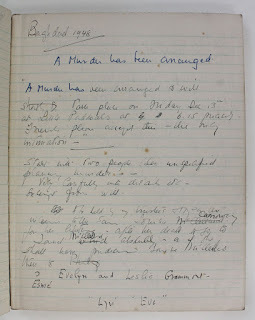
Published on November 20, 2017 03:30
November 19, 2017
Undercover Agent aka Counterspy - 1953 film review
As I settled down to watch another of the long-forgotten films that have been resurrected on the excellent Talking Pictures TV channel, I was startled to see on the titles that the screenplay was based on a short story by Julian Symons. The film, Undercover Agent, is also known as Counterspy, and was released in 1953. The story it was based on is called "Criss Cross Code", but I'm unfamiliar with it, and I now plan to set about tracking it down.
Nobody ever thinks of Symons as writing espionage fiction, as the film's titles would suggest, although a few of his early short stories (and this one must have been among his very earliest) touch on international intrigue. The film is a thriller, and although it's creaky in parts, the screenplay is a lively one, co-written by Guy Elmes and Gaston Lazare (the latter name sounds as though it may possibly have been a pseudonym - I can't trace any of Lazare's other work).
The cast is a cut above the average for a British B-movie. Dermot Walsh, later to play Richard the Lionheart in a popular TV series of that name, improbably plays a meek but persistent auditor, who is called in to look over the books of a company where some mischief is afoot. His wife is played by Hazel Court, who was at the time married to Walsh in real life. The principal villain is played by Alexander Gauge, memorable in the role of Friar Tuck in the TV series Robin Hood. Here, Gauge acts rather like a poor man's Sydney Greenstreet in The Maltese Falcon. Hermione Baddeley plays a fortune teller, and even less likely is the casting of Bill Travers - yes, the chap from Born Free - as a brutal thug.
Yet somehow it all makes for agreeable light entertainment, mainly because the pace of the script doesn't allow one time to reflect on the daftness of it all. I'm not sure what Symons would have made of it, and I strongly suspect it bears only a limited resemblance to his story. He probably cringed, but it's no mean feat to have a short story turned into a film, even a comparatively short movie such as this one. An enjoyable curiosity..
Nobody ever thinks of Symons as writing espionage fiction, as the film's titles would suggest, although a few of his early short stories (and this one must have been among his very earliest) touch on international intrigue. The film is a thriller, and although it's creaky in parts, the screenplay is a lively one, co-written by Guy Elmes and Gaston Lazare (the latter name sounds as though it may possibly have been a pseudonym - I can't trace any of Lazare's other work).
The cast is a cut above the average for a British B-movie. Dermot Walsh, later to play Richard the Lionheart in a popular TV series of that name, improbably plays a meek but persistent auditor, who is called in to look over the books of a company where some mischief is afoot. His wife is played by Hazel Court, who was at the time married to Walsh in real life. The principal villain is played by Alexander Gauge, memorable in the role of Friar Tuck in the TV series Robin Hood. Here, Gauge acts rather like a poor man's Sydney Greenstreet in The Maltese Falcon. Hermione Baddeley plays a fortune teller, and even less likely is the casting of Bill Travers - yes, the chap from Born Free - as a brutal thug.
Yet somehow it all makes for agreeable light entertainment, mainly because the pace of the script doesn't allow one time to reflect on the daftness of it all. I'm not sure what Symons would have made of it, and I strongly suspect it bears only a limited resemblance to his story. He probably cringed, but it's no mean feat to have a short story turned into a film, even a comparatively short movie such as this one. An enjoyable curiosity..
Published on November 19, 2017 15:09
November 17, 2017
Forgotten Book - Turn the Light Out As You Go
Edgar Lustgarten was a Manchester-born barrister with a love of writing who became a famous criminologist and broadcaster. He is best remembered for introducing the Scotland Yard TV series first screened in the Fifties, which has made a welcome reappearance lately on the Talking Pictures TV channel. He wrote extensively on true crime, but he also dabbled occasionally in fiction.
By far his best known novel is A Case to Answer, aka One More Unfortunate, which was widelyu translated and filmed with Rex Harrison and Lili Palmer, but despite the success of that book, he only wrote a handful of novels over the next thirty years. The very last one, Turn The Light Out As You Go, was published in 1978, the year of his death, and it made little or no impact, partly no doubt because by that time Lustgarten was a name from the past.
It's an unusual novel, though, and one that I found very readable, if flawed. It's a short book which may (I don't know) have been based in some respects on a real life case. Certainly, the treatment of the sexual assault and murder of a young girl is presented in a style almost verging on the documentary.
The focus is on the couple who live next door to the dead girl's family. Joe and Elsie are a middle-aged couple whose marriage has become stale. Elsie wonders - without any very substantial grounds - whether Joe might have killed the little girl - and the suspicion proves corrosive. Joe's life embarks on a downward spiral, even though he becomes friendly with one of the policemen working on the case, who doesn't regard him as a likely suspect. Other people come into the frame before a shock ending that wasn't (to my mind) foreshadowed quite as much as it might have been. It's a curious book in several ways, and the portrayal of working class life seemed a bit dated to me, even by the standards of the late Seventies. Lustgarten was not, I think, first and foremost a creative writer. All the same, I found the story interesting as well as unorthodox.
By far his best known novel is A Case to Answer, aka One More Unfortunate, which was widelyu translated and filmed with Rex Harrison and Lili Palmer, but despite the success of that book, he only wrote a handful of novels over the next thirty years. The very last one, Turn The Light Out As You Go, was published in 1978, the year of his death, and it made little or no impact, partly no doubt because by that time Lustgarten was a name from the past.
It's an unusual novel, though, and one that I found very readable, if flawed. It's a short book which may (I don't know) have been based in some respects on a real life case. Certainly, the treatment of the sexual assault and murder of a young girl is presented in a style almost verging on the documentary.
The focus is on the couple who live next door to the dead girl's family. Joe and Elsie are a middle-aged couple whose marriage has become stale. Elsie wonders - without any very substantial grounds - whether Joe might have killed the little girl - and the suspicion proves corrosive. Joe's life embarks on a downward spiral, even though he becomes friendly with one of the policemen working on the case, who doesn't regard him as a likely suspect. Other people come into the frame before a shock ending that wasn't (to my mind) foreshadowed quite as much as it might have been. It's a curious book in several ways, and the portrayal of working class life seemed a bit dated to me, even by the standards of the late Seventies. Lustgarten was not, I think, first and foremost a creative writer. All the same, I found the story interesting as well as unorthodox.
Published on November 17, 2017 04:59
November 15, 2017
Mystery Tour - Publication Day!
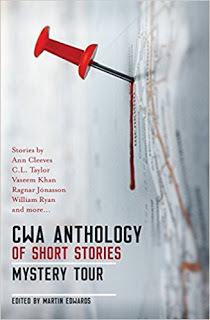
Today sees the publication of Mystery Tour (Orenda Publishing), the latest anthology of the Crime Writers' Association. Of all the anthologies I've edited for the CWA, this one contains more stories (28! got to be good value, right?) than any other. What's more, they are all making their first appearance in print, although Ann Cleeves' contribution has been broadcast on BBC Radio 4. The book is available in attractive hardback and paperback editions.
I can't quite believe it myself, but this is the fifth short story collection I've edited this year - the other four were all published by the British Library in the Crime Classics series. And this year also marks the 21st anniversary of my first CWA anthology, Perfectly Criminal, contributors to which included Val McDermid and Ian Rankin. Ian hadn't broken through at that time, but his story went on to win the CWA Short Story Dagger. In my brief intro to it, I said I believed he was destined to become a major force in the genre. One of my more accurate predictions, it's fair to say!
A good many talented writers feature in Mystery Tour, and I wouldn't be surprised if some of them featured in the CWA Dagger lists next year. Regardless of that, there is much to be enjoyed in the book, though I say it myself. You're spared individual story intros from me this time, because my focus was on including as many stories as possible - and the book weighs in at a hefty 100,000 words. Among the authors featured are such leading lights as Peter Lovesey and Cath Staincliffe, and also relatively new kids on the block, the likes of Vaseem Khan, Anna Mazzlola and Paul Gitsham. As ever, I've tried to include a very diverse mix of stories, such as the splendidly inventive "Accounting for Murder" by Christine Poulson.
I've dedicated the book to my colleagues on the CWA Board, a small gesture of appreciation for the hard work they put in to taking the CWA forward in a challenging but exciting period of growth and development. I'm not by nature a "committee person", but I must say that the present members of the Board are an absolute pleasure to work with, and their support is invaluable to me as Chair. I hope they are pleased with the book, and I am optimistic that crime fans will find a great deal in it to relish. Crime Time has already described it as "a cherishable collection", and needless to say, it will make a great Christmas present!
Published on November 15, 2017 04:17
Notable British Trials is Back!
More than sixty years have passed since the last entry appeared in the renowned series of Notable British Trials, published by William Hodge and Co. Now, I'm pleased to have had the chance to read a brand new entry in the series - number 84, no less. It's the Trial of Israel Lipski, edited by true crime writer M.W. Oldridge, and published by Mango Books under licence from William Hodge.
Pleasingly, this volume includes a lengthy foreword which provides a history of how Notable British Trials came into being. It's a fascinating story, and some of Oldridge's predecessors were legends of true crime writing - the likes of William Roughead and Frin Tennyson Jesse. Classic cases covered include those of Adelaide Bartlett, Florence Maybrick, Alfred Monson, and Buck Ruxton,
The famous trials are interesting in themselves. They also provide a vast amount of information for writers, not just true crime writers, but also novelists. When I was working on Dancing for the Hangman, I studied Filson Young's book about the trial of Dr Crippen very carefully. I was trying to write a novel which respected the facts that were known (while using fictional skills to explain the apparently inexplicable parts of the story), and the trial transcript gave me a great deal of help.
In line with the tradition of these books, Oldridge contributes a detailed introduction which sets the case in context. Lipski's murder of Miram Angel in 1887 attracted a good deal of attention at at the time, and the case does have intriguing features, although I find it less mysterious than, say the Bartlett or Maybrick cases. There are illustrations, and all in all I think Mango have done true crime fans a real service in bringing this famous publishing brand back to life.
Pleasingly, this volume includes a lengthy foreword which provides a history of how Notable British Trials came into being. It's a fascinating story, and some of Oldridge's predecessors were legends of true crime writing - the likes of William Roughead and Frin Tennyson Jesse. Classic cases covered include those of Adelaide Bartlett, Florence Maybrick, Alfred Monson, and Buck Ruxton,
The famous trials are interesting in themselves. They also provide a vast amount of information for writers, not just true crime writers, but also novelists. When I was working on Dancing for the Hangman, I studied Filson Young's book about the trial of Dr Crippen very carefully. I was trying to write a novel which respected the facts that were known (while using fictional skills to explain the apparently inexplicable parts of the story), and the trial transcript gave me a great deal of help.
In line with the tradition of these books, Oldridge contributes a detailed introduction which sets the case in context. Lipski's murder of Miram Angel in 1887 attracted a good deal of attention at at the time, and the case does have intriguing features, although I find it less mysterious than, say the Bartlett or Maybrick cases. There are illustrations, and all in all I think Mango have done true crime fans a real service in bringing this famous publishing brand back to life.
Published on November 15, 2017 02:00
November 13, 2017
After Ten Years of Blogging...
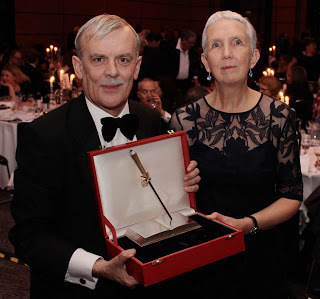
..it's a good moment to reflect. Actually, the ten-year anniversary was a month ago, but life has been too hectic to allow many moments of reflection. When I started this blog - the first post was on 13 October 2007 - my prime aim was to share my enthusiasm for crime writing. As part of this, I wanted to give to anyone who was an interested an insight into the joys and frustrations of the professional life of a mid-list crime writer, someone who had been around for quite a long time, without becoming remotely famous. Hence the blog's title. I've often been asked if I write under my name, and it's a polite way of making it clear that the person asking the question has never heard of me.
In 2007, I had no idea of what the future held for me as a writer, but I did tell the story of my first TV option, and the fact that the dizzying excitement ultimately faded when it became clear that the show would never be made. Ten years on, I've had half a dozen TV options, covering the Harry Devlin series, the Lake District series, and even The Golden Age of Murder, but still none of the scripts has actually made it on to the screen. It's frustrating (though option fees are definitely a consolation), but it's a common situation, and the only sensible reaction is to be philosophical. You can't be lucky all the time. And overall, I've been extraordinarily lucky.
If you'd told me ten years ago what would happen in my writing life over the next decade, I'd have suspected a cruel hoax. Back then, I wasn't even a member of the Detection Club, let alone its President, archivist, and author of The Golden Age of Murder. And I was nowhere near joining the committee of the CWA - my day job made it impossible - let alone becoming its Chair. I'd never won a literary award, and now I've picked up a totally unexpected number here and in the US, as well as various shortlistings. I'd never even set foot in the British Library, whereas in the past year I've been interviewed there by Mark Lawson, conducted a week-end master class there, plotted a murder mystery for their pop-up shop, and compiled my tenth BL anthology, as well as publishing The Story of Classic Crime in 100 Books and clocking up more than 40 intros to the Classic Crime series.
The past three years, in particular, have been amazing, and it's hard to figure out exactly what has made the difference. Some of it must be down to the fact that, although I'm still a practising lawyer, I now spend much less time on the law, and much of the energy I devoted to the day job (and endless commuting) is now directed towards writing-related activities. I've found, as many writers found before me, that there are all sorts of fascinating opportunities out there
Since I returned to the UK from the Toronto Bouchercon last month, I've taken part in literary festivals in Lancaster and in Dalton-in-Furness (the ancient capital of Furness might just feature in the next Lake District Mystery!) and given library talks in York, Beeston, and West Bridgford and a bookshop talk in Bramhall. I've hosted the CWA Daggers Awards and the Detection Club's main annual dinner, survived a CWA board meeting without provoking my admirable colleagues to launch a coup d'etat, enjoyed an excellent lunch with the CWA's Northern Chapter, and given a talk in London to a marvellous group of American crime fans, as well as signing a pile of copies of the CWA anthology Mystery Tour at Goldsboro Books and piles of other books in Foyles and Waterstones. It's been a mad whirl of activity, but hugely enjoyable.
And I hope that if there are any writers, or would-be writers, reading this who are struggling with confidence at present, my story may offer them a bit of encouragement. Despite all the pitfalls, it's a privilege to live a writer's life, and I hate to see talented authors become so discouraged that they give up, something that happens far too often.
Writing is, as I said at the Dagger awards, a tough game, and setbacks are many; even in the past couple of weeks, I've had a couple of projects run into snags. I'm still very, very far from being a Big Name among authors. But surely the point about writing is to try to make the most of your skills and your opportunities, and hope that an occasional lucky break will compensate for all the knock-backs, however numerous the latter. Above all, the key is to have a good time, no matter how many well-meaning people keep wanting to know if you write under your own name!
Published on November 13, 2017 05:07
November 10, 2017
Forgotten Book - The Announcer
I've talked previously about Donald Henderson, a writer who has long intrigued me. Because he died young, his work fell out of print quite quickly, and he's hardly ever been discussed in reference books (though I do talk about him in The Story of Classic Crime). Recently, I read his 1946 book, The Announcer, and found it extremely enjoyable.
The book's alternative title in the US, and perhaps a better one, was A Voice Like Velvet, which is a phrase taken from the story, concerning the protagonist, Ernest Bisham. He happens to be a BBC radio announcer by day. But he is also, by night....wait for it...a cat-burglar!
As a premise this carries, perhaps a whiff of the absurd, but in a pleasing way. Henderson worked for the BBC, and he has a great deal of fun with his account of BBC life. I'm sure it appealed to his ironic sense of humour to imagine a very correct announcer as a master-criminal. His wit reminds me of Francis Iles, and he shares Iles' interest in true crime: Crippen, Jack the Ripper, and Neil Cream are among the killers name-checked in the story.
Like Iles, Henderson had considerable gifts as a novelist. This is a well-written story, with plenty of nice lines, but he also manages to create suspense in a very pleasing way. I found myself rooting for Ernest even when he behaved foolishly, and especially when he found himself in tricky situations, facing almost certain discovery. This really is a hidden gem.
The book's alternative title in the US, and perhaps a better one, was A Voice Like Velvet, which is a phrase taken from the story, concerning the protagonist, Ernest Bisham. He happens to be a BBC radio announcer by day. But he is also, by night....wait for it...a cat-burglar!
As a premise this carries, perhaps a whiff of the absurd, but in a pleasing way. Henderson worked for the BBC, and he has a great deal of fun with his account of BBC life. I'm sure it appealed to his ironic sense of humour to imagine a very correct announcer as a master-criminal. His wit reminds me of Francis Iles, and he shares Iles' interest in true crime: Crippen, Jack the Ripper, and Neil Cream are among the killers name-checked in the story.
Like Iles, Henderson had considerable gifts as a novelist. This is a well-written story, with plenty of nice lines, but he also manages to create suspense in a very pleasing way. I found myself rooting for Ernest even when he behaved foolishly, and especially when he found himself in tricky situations, facing almost certain discovery. This really is a hidden gem.
Published on November 10, 2017 07:03
November 8, 2017
Lady of Deceit - aka Born to Kill - 1947 film review
Lady of Deceit, also known as Born to Kill was directed by Robert Wise, who much later was responsible for The Sound of Music. Two films more different in tone as well as storyline would be hard to imagine. Lady of Deceit, based on James Gunn's novel Deadlier Than the Male, is a dark story about amoral people, and this may account for the fact that it didn't do particularly well on first release. Uplifting it is not.
Claire Trevor plays Helen Trent, who has gone to Reno to get a divorce. Whilst she's there, she gets to know a breezy young woman who goes out with a new man, much to displeasure of Sam Wild (played by Lawrence Tierney), who is obsessed with her. Wild kills both his ex and her admirer. Helen discovers the bodies, but decides not to get involved, and goes back to San Francisco. At the station, she bumps into Wild, and they fall for each other.
However, Helen is engaged to a rich young chap, much to Wild's displeasure. Helen is the foster sister of wealthy Georgia, played by Audrey Long (who was married at one time to Leslie Charteris, creator of the Saint). Wild seduces nice but naive Georgia, and they marry, but Wild and Helen remain besotted with each other. Wild's admiring chum Marty (Elisha Cook Jr) joins the not very happy household, and when a friend of Wild's victim hires a lazy and unreliable private eye, Marty tries to protect Wild, before events spin out of control.
Esther Howard, who hires the P.I., is perhaps the most appealing character in the film, not that the competition is strong. She's an alcoholic, but she is trying to do the right thing by her friend. Claire Trevor does a good job as the "iceberg" Helen, but I felt that Lawrence Tierney, who late in life became more famous than ever thanks to appearing in Reservoir Dogs, was wooden in the extreme. He tries to be a tough guy in the Humphrey Bogart style, and apparently was a tough guy in real life. But his lack of charisma is a big drawback. Robert Mitchum would have done a much better job, I feel. All the same, this downbeat movie is watchable from start to finish.
Claire Trevor plays Helen Trent, who has gone to Reno to get a divorce. Whilst she's there, she gets to know a breezy young woman who goes out with a new man, much to displeasure of Sam Wild (played by Lawrence Tierney), who is obsessed with her. Wild kills both his ex and her admirer. Helen discovers the bodies, but decides not to get involved, and goes back to San Francisco. At the station, she bumps into Wild, and they fall for each other.
However, Helen is engaged to a rich young chap, much to Wild's displeasure. Helen is the foster sister of wealthy Georgia, played by Audrey Long (who was married at one time to Leslie Charteris, creator of the Saint). Wild seduces nice but naive Georgia, and they marry, but Wild and Helen remain besotted with each other. Wild's admiring chum Marty (Elisha Cook Jr) joins the not very happy household, and when a friend of Wild's victim hires a lazy and unreliable private eye, Marty tries to protect Wild, before events spin out of control.
Esther Howard, who hires the P.I., is perhaps the most appealing character in the film, not that the competition is strong. She's an alcoholic, but she is trying to do the right thing by her friend. Claire Trevor does a good job as the "iceberg" Helen, but I felt that Lawrence Tierney, who late in life became more famous than ever thanks to appearing in Reservoir Dogs, was wooden in the extreme. He tries to be a tough guy in the Humphrey Bogart style, and apparently was a tough guy in real life. But his lack of charisma is a big drawback. Robert Mitchum would have done a much better job, I feel. All the same, this downbeat movie is watchable from start to finish.
Published on November 08, 2017 03:00



